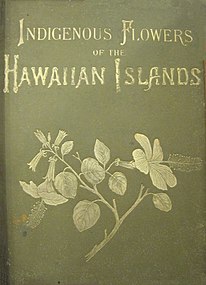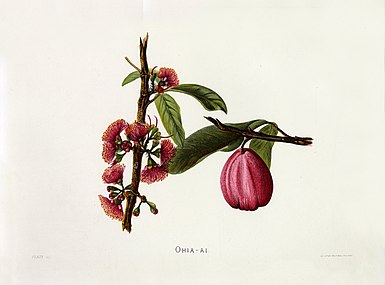Isabella McHutcheson Sinclair
Isabella McHutcheson Sinclair | |
|---|---|
 | |
| Born | Isabella McHutcheson 1842 |
| Died | 1900 |
| Nationality | British |
| Known for | Botany, Scientific illustration, Botanical illustration |
| Notable work | Indigenous flowers of the Hawaiian islands (1885) |
| Spouse | Francis Sinclair Jr. |
Isabella McHutcheson Sinclair (1842 – 29 December 1900) was a Scottish born botanist, author and botanical illustrator.[1] Her best known work is the 1885 book Indigenous flowers of the Hawaiian islands, the first book published with colour images of Hawaiian flowering plants.
Biography
[edit]Sinclair was born Isabella McHutcheson in 1840 near Stirling, Scotland.[2][3] She is believed to be a daughter of Isabella (Phelps) McHutcheson and her husband William McHutcheson, who was a brother of Elizabeth McHutcheson Sinclair.[4] She emigrated to New Zealand with her family as a young child.[4] On 7 August 1866, Isabella McHutcheson of Blenheim, Marlborough, New Zealand married her cousin, Francis Sinclair, Jr.[5] After marriage to her husband Francis, Sinclair moved with his family to Hawai'i. Her aunt and mother-in-law, Elizabeth Sinclair, was a farmer and plantation owner in New Zealand and Hawaii, best known as the matriarch of the Sinclair family that bought the Hawaiian island of Niʻihau in 1864 from King Kamehameha V for the sum of $10,000 in gold.[6]
Works
[edit]In Hawaii, Sinclair produced her most notable work Indigenous flowers of the Hawaiian islands.[7][8] This was the first book published with colour images of Hawaiian flowering plants.[9]
After her marriage, Sinclair lived with her husband in Kiekie on the island of Nii'hau and later in Makaweli on the island of Kauai.[10] She explored Niihau, Waimea Valley, Olokele Valley, Kokee and other locations, painting the native flora there and researching information about those species from Native Hawaiians. She collected specimens of each native flowering plant and illustrated each one, creating a portfolio of 44 full-page color plates. She sent the specimens to Joseph Dalton Hooker, then director of the Royal Botanical Gardens at Kew, England, for scientific identification. Dr. Hooker provided her with each flower's botanical name, which she documented along with the Hawaiian names, natural habitats and blossoming seasons of each species.[10]
In 1885, with the encouragement of Hooker, Sinclair published Indigenous Flowers of the Hawaiian Islands.[11] She dedicated the volume: “To the Hawaiian Chiefs and People who have been most appreciative friends, and most lenient critics, this work is affectionately inscribed.”[10][1]
Isabella was among the first authors to express concern about the loss of native habitats on Hawaiian flora due to land development and competition from invasive species:[1]
"The Hawaiian flora seems to grow in an easy, careless way," she wrote, "which, though pleasingly artistic, and well adapted to what may be termed the natural state of the islands, will not long survive the invasions of foreign plants and changed conditions. Forest fires, animals and agriculture, have so changed the islands, within the last fifty or sixty years, that one can now travel for miles . . . without finding a single indigenous plant; the ground being wholly taken possession of by weeds, shrubs and grasses, imported from various countries. . . ." .[12]
Publications
[edit]The standard author abbreviation I.Sinclair is used to indicate this person as the author when citing a botanical name.[13]
- Indigenous flowers of the Hawaiian islands by Mrs Francis Sinclair Jr. (London, Sampson Low, Marston, Searle, and Rivington., 1885)
-
Indigenous Flowers of the Hawaiian Islands, Mrs. Frances Sinclair, cover
-
Indigenous Flowers of the Hawaiian Islands, Plate 41
-
Indigenous Flowers of the Hawaiian Islands, Plate 37
-
Indigenous Flowers of the Hawaiian Islands, Plate 3
Family ties
[edit]Isabella's father William McHutcheson eventually moved to Oamaru, New Zealand.[14][15] Isabella's brother, also named William McHutcheson, likely visited his sister during an extensive six-months tour in 1886 that included Hawaii, North America, England, and Scotland. He described his travels in The New Zealander Abroad (1888). He also wrote a serialized account of colonial life, "The New Zealander at Home" (1890), and published Camp-life in Fiordland, New Zealand (1892).[14][16]
At some point, Isabella and her husband went to California. Isabella died in San Jose, California, on 29 December 1890[17] and was buried at Trinity Church on 31 December 1890. Her name has been transcribed from their records as "Sinclaire (Mrs.) Frances"[18]
In 1902, Francis Sinclair returned to New Zealand and married Isabella's widowed sister, Williamina Shirriffs. He had no issue from either marriage. Francis spent much of the rest of his life in England, published several books of poetry and essays, and died on 22 July 1916 on the Island of Jersey.[4][14]
References
[edit]- ^ a b c Te Papa (Museum); Lehnebach, Carlos, eds. (2023). Flora: celebrating our botanical world. Wellington, New Zealand: Te Papa Press. pp. 34–35. ISBN 978-1-9911509-1-2. OCLC 1409457791.
- ^ "Digital Collections – Museum Consortium". www.museum.hawaii.edu. Retrieved 5 October 2018.
- ^ Snodgrass, Mary Ellen (2018). Frontier women and their art : a chronological encyclopedia. Lanham: Rowman & Littlefield. p. 305. ISBN 9781538109762. OCLC 1033673487.
- ^ a b c Peterson, Barbara Bennett (February 2000). Sinclair, Isabella McHutcheson (1840–1890), author and illustrator. American National Biography Online. Vol. 1. Oxford University Press. doi:10.1093/anb/9780198606697.article.1701238.
- ^ "Francis and Eliza Sinclair and John McHutcheson". Blenheim175. 15 February 2015. Retrieved 13 October 2018.
The Lyttelton Times of 29 August 1866 has a Marriage Notice: "Sinclair-McHutchison – August 7, at Blenheim, Marlborough, by the Rev Russell, Francis Sinclair, Niihau, Sandwich Islands, to Isabella, third daughter of William McHutchison of Blenheim."
- ^ Thomas, Michael B. (2008). "Indigenous Flowers of the Hawaiian Islands, Isabella Sinclair (1885)". Flickr. Retrieved 13 October 2018.
- ^ Valauskas, Edward J. (November 2014). "Isabella in Hawaii: The adventures of an amateur botanist in the 1860s | Chicago Botanic Garden". www.chicagobotanic.org. Retrieved 5 October 2018.
- ^ St. John, Harold (1954). "Review of Mrs. Sinclair's "Indigenous Flowers of the Hawaiian Islands"". Pacific Science. 8 (2): 140–146. ISSN 0030-8870 – via Biodiversity Heritage Library.
- ^ Ziegler, Alan C. (2002). Hawaiian natural history, ecology, and evolution. Honolulu: University of Hawai'i Press. p. 385. ISBN 978-0824821906. OCLC 48084188.
- ^ a b c Sobeleski, Hank (19 January 2014). "Author, illustrator Isabella McHutcheson Sinclair – The Garden Island". www.thegardenisland.com. Retrieved 13 October 2018.
- ^ Sinclair, Mrs. Francis (1885). Indigenous flowers of the Hawaiian islands. National Agricultural Library U. S. Department of Agriculture. London : Sampson Low, Marston, Searle, and Rivington.
- ^ Conover, Adele (1 November 1996). "A onetime rancher wages lonely war to save rare plants". Smithsonian. 27 (8).
- ^ International Plant Names Index. I.Sinclair.
- ^ a b c Laracy, Hugh (2013). "The Sinclairs Of Pigeon Bay, or ʹThe Prehistory of the Robinsons of Niʹihauʹ: An essay in historiography, or ʹtales their mother told themʹ". Watriama and Co: Further Pacific Islands Portraits. ANU Press. pp. 33–52. ISBN 978-1-921666-33-9. JSTOR j.ctt5hgxsb.5.
- ^ "Mr. William Mchutcheson". The Cyclopedia of New Zealand [Otago & Southland Provincial Districts]. Christchurch, N.Z.: Cyclopedia Company, Limited. 1903. Retrieved 10 September 2018.
- ^ Forbes, David W. (1998). Hawaiian National Bibliography, 1780–1900: 1881–1900. University of Hawaii Press. p. 301. ISBN 9780824826369. Retrieved 10 September 2018.
- ^ Desmond, Ray (25 February 1994). Dictionary Of British And Irish Botanists And Horticulturists Including plant collectors, flower painters and garden designers. CRC Press. ISBN 9780850668438.
- ^ "Burials from Trinity Church, San Jose, CA, 1860 – 1903 – Chronological Listing". Retrieved 13 October 2018.
- 1842 births
- 1910 deaths
- 19th-century American artists
- American women illustrators
- Hawaiian Kingdom people
- American illustrators
- British botanical illustrators
- Artists from Hawaii
- 19th-century American women artists
- New Zealand illustrators
- British expatriates in the Hawaiian Kingdom
- American women botanists
- American botanists
- 19th-century New Zealand botanists
- 19th-century American women scientists




